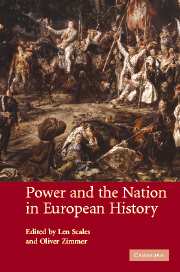Book contents
- Frontmatter
- Contents
- List of contributors
- Introduction
- PART I APPROACHES AND DEBATES
- PART II THE MIDDLE AGES
- PART III ROUTES TO MODERNITY
- 8 The state and Russian national identity
- 9 Ordering the kaleidoscope: the construction of identities in the lands of the Polish-Lithuanian Commonwealth since 1569
- 10 Nationhood at the margin: identity, regionality and the English crown in the seventeenth century
- 11 The nation in the age of revolution
- PART IV MODERNITY
- Index
9 - Ordering the kaleidoscope: the construction of identities in the lands of the Polish-Lithuanian Commonwealth since 1569
Published online by Cambridge University Press: 02 December 2009
- Frontmatter
- Contents
- List of contributors
- Introduction
- PART I APPROACHES AND DEBATES
- PART II THE MIDDLE AGES
- PART III ROUTES TO MODERNITY
- 8 The state and Russian national identity
- 9 Ordering the kaleidoscope: the construction of identities in the lands of the Polish-Lithuanian Commonwealth since 1569
- 10 Nationhood at the margin: identity, regionality and the English crown in the seventeenth century
- 11 The nation in the age of revolution
- PART IV MODERNITY
- Index
Summary
In this sense I can consider myself a typical East European. It seems to be true that his differentia specifica can be boiled down to a lack of form – both inner and outer … he always remains an adolescent, governed by a sudden ebb or flow of inner chaos. Form is achieved in stable societies … The things that surround us in childhood need no justification, they are self-evident. If, however, they whirl about like particles in a kaleidoscope, ceaselessly changing position, it takes no small amount of energy simply to plant one's feet on solid ground without falling.
Czesław Miłosz, the Nobel prize-winning poet, born in what is now Lithuania in 1911, grew up in the city now called Vilnius during and after the First World War. He became a Polish citizen involuntarily when the city he knew as Wilno was forcibly incorporated into the Polish state in 1919, moving to a Warsaw he neither knew nor loved after Wilno became Vilnius when it was again forcibly incorporated, this time into Lithuania, as a consequence of the Ribbentrop–Molotov Pact. After 1945 he briefly served the Polish People's Republic as a diplomat, before heading for the United States, where he continued to write his poetry in the Polish language that was his native tongue, but which did not necessarily define his national identity.
- Type
- Chapter
- Information
- Power and the Nation in European History , pp. 212 - 231Publisher: Cambridge University PressPrint publication year: 2005
- 1
- Cited by



